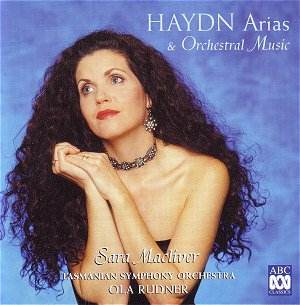If the appealing cover photograph of the solo soprano
tempts the collector to look more closely at this disc, well and good.
Sara Macliver may not be particularly well known in Europe, and nor
is the orchestra or its Principal Conductor, but this is a distinguished
and satisfying disc which will give much pleasure to lovers of good
singing and admirers of the composer.
The programme is made up of an aria from two Haydn
operas composed whilst he was in the service of the Esterházy
family. The first of these, from Il mondo della luna, was composed
for the celebrated coloratura soprano Marianna Puttler, but Sara Macliver
is more than equal to the demands of the piece. There are also two arias
from each of Haydn’s most famous oratorios. The two extracts from The
Creation are given in English, a long-standing tradition in the
United Kingdom, and sanctioned by the composer. Here, as elsewhere,
the singer applies some delicate ornamentation when the main theme returns,
generally to convincing effect and with only one or two surprises. The
lovely little cavatina from The Seasons is beautifully done.
The programme closes with a noble setting of a Petrarch sonnet. To a
grave adagio, the poet wanders in the country in disconsolate
reflection, but when his thoughts take a more positive turn, to conclude
that love will prevail, the music becomes animated and brilliant, a
jubilant conclusion to the recital. The overtures of the two operas
are also given, as well a charming orchestral Nocturne, creating a programme
which has been most carefully planned and which you can either dip into,
as I did the first time, or listen to in one sitting, as I did the second
time. Either way, the result is sheer delight.
Sara Macliver possesses a most beautiful, clear voice
which easily rises into the highest register. Words are always extremely
clear, and her vocal production is even throughout the range. I heard
none of the intonation problems that bothered me intermittently in her
performance of Orff’s Carmina Burana, also on ABC Classics. This
being Haydn there is little of a tragic nature here, and hers is a voice
full of smiles, though when drama is called for, as in the final aria,
she is fully capable of providing it.
I recently reviewed the Tasmanian Symphony Orchestra’s
Beethoven symphony cycle, and was most taken with their playing. Here
too the strings impress by a remarkable unanimity of attack in rapid
passages – the playing really sparkles in places – and the wind contribution,
including the principals, is first class too. The conductor is fully
at home with the composer’s idiom, a reliable guide in this music, and
a most sensitive and attentive accompanist.
As with the Beethoven cycle the production values of
this issue are extremely high, and I particularly want to draw attention
to quite the most informative and readable booklet notes, by Erin Helyard,
that I have seen for a long time. All sung texts are provided and translated
though non-English speakers must look elsewhere. The recording is excellent.
This is altogether a most successful disc which would
grace any collection.
William Hedley

![]() Sara Macliver, soprano
Sara Macliver, soprano
![]() ABC CLASSICS 472 447-2
[56.36]
ABC CLASSICS 472 447-2
[56.36]